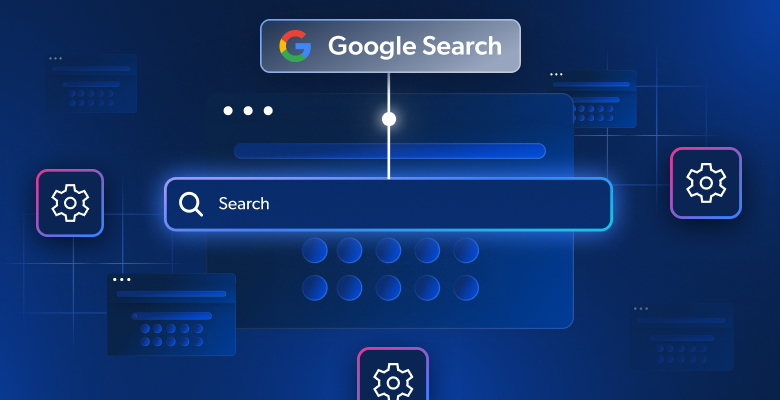Let’s understand how a proxy works and explore a winning approach to adopting the right provider.
This in-depth guide will cover:
- What is a proxy server?
- Types of proxy servers.
- What to look for in a proxy server provider.
What Is a Proxy Server?
A proxy server is an intermediary server that sits between a client and a target site. It acts as a bridge for communication, providing an additional layer of security and privacy by masking the client’s IP address.
When a client makes an HTTP request to a website, the request is intercepted by the proxy server, which forwards it to the destination on behalf of the client. The site responds to the proxy server, which in turn sends the response back to the client. This process helps protect the client’s identity, as the destination site sees the requests as coming from the proxy.
This mechanism delivers various benefits, including:
- Better performances through caching
- Avoidance of IP bans, CAPTCHAs, and user fingerprinting.
- Access to geo-restricted content.
- Bandwidth throttling and rate limit bypass.
- Enhanced security.
Types of Proxy Servers
Proxy servers can serve various purposes, from improving security and protecting privacy to optimizing network performance. There are then different types of proxy servers, each with its own characteristics. Based on these, they can be divided into several categories.
Let’s explore the most popular ones.
By IP Address Location
According to the IP provided to the user, they can be categorized into:
- Datacenter proxies: These servers are hosted in datacenters and provide IPs that are not associated with any Internet Service Provider (ISP) or residential location. They are fast but may be more easily detected and blocked by websites due to their identifiable IP ranges.
- Residential proxies: Offer IP addresses assigned to real residential devices. They guarantee a high level of anonymity because they appear as regular IP addresses from a specific location. Residential proxies are perfect for accessing sites relying on geo-restriction blocks or anti-bot measures.
- ISP proxies: Expose static residential IPs provided by ISPs (Internet Service Providers). They are fast, secure, and highly reliable, representing a perfect solution for SEO monitoring, web browsing, and market research.
- Mobile proxies: Their IPs come from real mobile devices. They provide a high level of anonymity and are useful for accessing mobile-specific applications, sites, or content.
Find out more in our in-depth guide on proxy IP types.
By IP Rotation
These types of proxies are split on whether they deliver a fixed IP or one that changes over time in:
- Static proxies: Use a fixed IP address for each connection request. They provide a stable and consistent IP during the entire proxy session. This is useful whenever you need to perform IP-based operations.
- Rotating proxies: Dynamically change the IP address for each connection or after a specific period or number of requests. This type of proxy is perfect for keep appearing as a different user, allowing you to bypass rate-limiting restrictions imposed by anti-bot and anti-scraping systems.
Read more about static vs. rotating proxies.
By User Usage
Based on the type of access they offer to users, there are:
- Shared proxies: Multiple users have access to the same server simultaneously. These proxies are cost-effective and suitable for general browsing or dealing with non-sensitive information. They may be less reliable and can potentially impact performance if many users share the same proxy.
- Dedicated proxies: Servers that provide exclusive use to a single user. They offer better performance, higher reliability, and enhanced security than shared proxies. Generally, dedicated proxies come in handy for tasks that require dedicated resources or involve sensitive information.
By Level of Anonymity
There is a proxy server type for each of the three levels of anonymity:
- Transparent proxies (level 3): Reveal your IP address to the destination server and the fact that you are using a proxy. They are common because they do not have to be configured on the user’s devices. They guarantee no anonymity and are used primarily for caching or content filtering.
- Anonymous proxies (level 2): Hide your address from the target server but may still add headers indicating that a proxy is being used. They offer some level of anonymity but their requests can still be detected by advanced anti-proxy measures.
- Elite proxies (level 3): Replace your own IP with a new one and remove all your identifying information from HTTP headers. They provide the highest level of anonymity, completely hiding your IP and avoiding any proxy-related headers. Elite proxies are less likely to be detected by anti-bot technologies and are suitable for scenarios requiring maximum anonymity.
By Protocol
Depending on the ISO/OSI layer they operate, you can find:
- HTTP/HTTPS proxies: Operate at the application layer, handling both HTTP and HTTPS traffic. They can intercept, filter, and modify HTTP requests and responses.
- SOCKS proxies: Work at the transport layer and can handle various protocols, including HTTP, FTP, and SMTP. They provide high flexibility and are commonly used for routing traffic through firewalls or for applications requiring non-HTTP traffic.
- SSL proxies: Gateway for TLS (Transport Layer Security) connections. They decrypt and re-encrypt data, offering a step up from HTTP and HTTPS proxies in terms of anonymity. Read our article on SSL proxies to learn more.
Take a look at our comparison article to understand the difference between SOCKS vs. HTTPS proxies.
What to Look for in a Proxy Server Provider
When choosing a provider, it is essential to take some specific factors into consideration. Only by examining them can you be sure of choosing a reliable and suitable service for your needs.
Here is the list of the key elements to look for.
1. Several Types of Servers
Best proxy server providers sell a wide variety of server types. This ensures that you have the flexibility to address different use cases, such as accessing region-specific content, performing web scraping, protecting your identity, or dealing with ad verification.
Typically, proxy providers offer datacenter, residential, ISP, and mobile proxies. Horizontally, they should have both shared and dedicated servers, each providing static or rotating IPs with varying levels of anonymity.
In addition to different types of proxies, a good vendor must also have a large number of IPs to choose from. Ideally, several million. Suppliers with a ton of servers are more likely to have higher reliability and performance as they can distribute their user base across the large server pool.
This wide range of proxies and IPs allows you to pick the most effective one based on their unique needs, such as speed, IP location, traffic type, and security requirements.
2. Different Pricing Plans
A reliable proxy server service offers several plans, each with its own price and features. There are a few types of offerings used in this industry, and the most popular are:
- Pay-as-you-go plans: You are charged according to the GB of proxy traffic used. This model is ideal if you have predictable data usage or are looking to pay only for what you consume.
- Subscription-based plans: You pay a monthly or yearly fixed price to gain access to a particular level of service, defined in terms of features available and bandwidth limits.
- Customized plans: Special offerings tailored to meet the enterprise needs of large companies. They usually involve a dedicated account manager for support and specific limits based on the agreement made.
Reviewing the provider’s pricing structure is critical to ensure that it is in line with your budget and needs. Another key aspect to consider is the presence of a free trial. This enables you to test the proxy servers before committing to a paid plan.
3. Worldwide Infrastructure
A reputable company in this industry should have servers on all six populated continents to ensure comprehensive geographical coverage. A global infrastructure with servers distributed across the globe offers several advantages.
First, it gives you the ability to access content and sites from different countries, cities, and regions. When servers are strategically placed in numerous areas, you can get local IPs from all over the world. This helps circumvent geo-restrictions and access region-specific content.
Second, it improves performance and speed. By having servers closer to users geographically, the provider can ensure minimal latency. In other words, this means higher connection speed and a better proxy experience.
Third, a wide-reaching infrastructure increases stability and helps achieve uninterrupted service. If a server at one location experiences problems or downtime, you can simply switch to another server with no headaches.
In general, the more proxy servers the provider controls, the better the performance and reliability it offers. In addition, this demonstrates its commitment to meeting the diverse users’ needs and ensuring a seamless experience.
4. High Reliability, Uptime, and Availability
A reliable provider must have a robust server infrastructure, with systems in place to minimize downtime. This includes redundant servers, heartbeat monitoring, and a proactive approach to maintenance upkeep to quickly address any potential issue.
Best proxy servers manage to be accessible virtually always and without slowdowns. A provider with a reputation for high reliability ensures that its proxy connections will remain stable and efficient.
Reliability without high uptime would be impossible, though. The percentage of time the servers are up and running must be greater than 99%. This ensures that proxies are up and running, minimizing service interruptions.
With uptime also comes availability, which refers to the ability to access proxy servers at any time. A great supplier will make it a priority to ensure that its systems are available and accessible whenever its users need them.
5. Responsive Technical Support
Dealing with proxies may not be easy, especially for teams unfamiliar with this technology. Here is why technical support is crucial for a smooth experience.
A service worth adopting has a fast and efficient technical support team available 24/7. A team of experts will be available to provide you assistance at any time, regardless of your geographic location or time zone. You must be able to address any issues or concerns that may arise through prompt and knowledgeable help.
Furthermore, you should be able to contact the company through various channels, including e-mail, live chat, and tickets. When a problem occurs, you do not know what kind of stress you are under or where you are. So, you need to have the ability to choose your preferred mode of communication.
In addition to reactive support, best proxy server providers also offer training resources, including documentation, tutorials, videos, and blog posts. This knowledge base is full of self-help solutions and fosters a better understanding of the proxy world.
Conclusion
In this article, you saw what to consider when evaluating proxy server solutions. There are dozens of providers online, and reviewing them all will take months. Since not all offer a free trial, it can even cost you a lot of money. Luckily, there is a solution and it is called Bright Data!
Bright Data controls the best proxy servers, serving Fortune 500 companies and over 20,000 customers, due to its commitment to meeting the key aspects presented here. It offers a wide range of proxy types:
- Datacenter proxies – Over 770,000 datacenter IPs
- Residential proxies – Over 150M residential IPs
- ISP proxies – Over 700,000 ISP IPs
- Mobile proxies – Over 7M mobile IPs
On top of that, as one of the best web scraping tools in the market, it also provides IP rotation, location filtering, and a complete scraping API.
With a vast global network and extensive IP pools, Bright Data guarantees exceptional availability, reliability, and performance. If you need help, the industry-awarded customer support available 24/7 will offer assistance through multiple channels.
Overall, Bright Data excels in all aspects discussed in this guide, making it one of the best proxy server vendors available.






